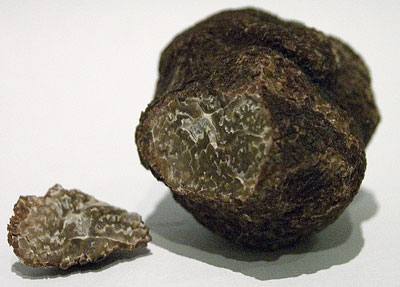
18g. Harvested at 2-25pm on Wednesday, June 14th 2006.
We were on the way out of the truffière. Peg was bored, more interested in sniffing down mouseholes than round trees, keen to get back to her bone. As she passed the last hazel, I decided to stick my trowel into the earth at its base, to see if there was much root mass close to the suckers. The little trench was a couple of inches deep, and I had a sniff of the soil - as one does - and, yes, there was a hint of truffle. Wishful thinking has led me to this point many times. Damp earth is one of the aromas in a truffle's armoury. I scraped a little more earth, carefully. No mistaking the smell. A real truffle. I dug a little more, and knocked the end off the truffle. A strangled expletive emerged. Peg was unimpressed, off after mice. I dropped the trowel and used my fingers to carefully rip the truffle from the soil. The already beautiful day - blue and cold, snow on the hills - became brighter. It wasn't fully ripe - still slightly reddish in the skin, and with brown rather than black flesh, but it had a nice scent. It looks like we're a week or 10 days away from full ripeness - in line with the expectations of other local truffle growers.
First question. What will I do with it? I'll hang on to it until next week, to use as Exibit A at a talk I'm giving. Take a few more photographs of it and its tree. Then I'll eat it. Peg and I will return to truffle hunting after the NZ Truffle Association conference at the end of the month. And she'll have to stop relying on charm to earn her bones. Nose to ground, dog...
Second question. How many will we have? No idea. It won't be the only one there, I'm sure. The hazel that produced it is not in any way remarkable, no outstanding brulée, not huge. Friends can look forward to some fine meals.
I had Oeufs aux truffes sans truffes for breakfast today. Good days begin with truffled eggs.
.jpg)


